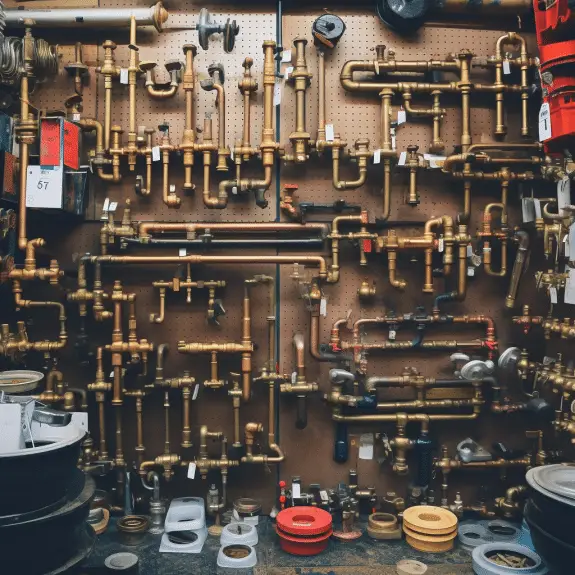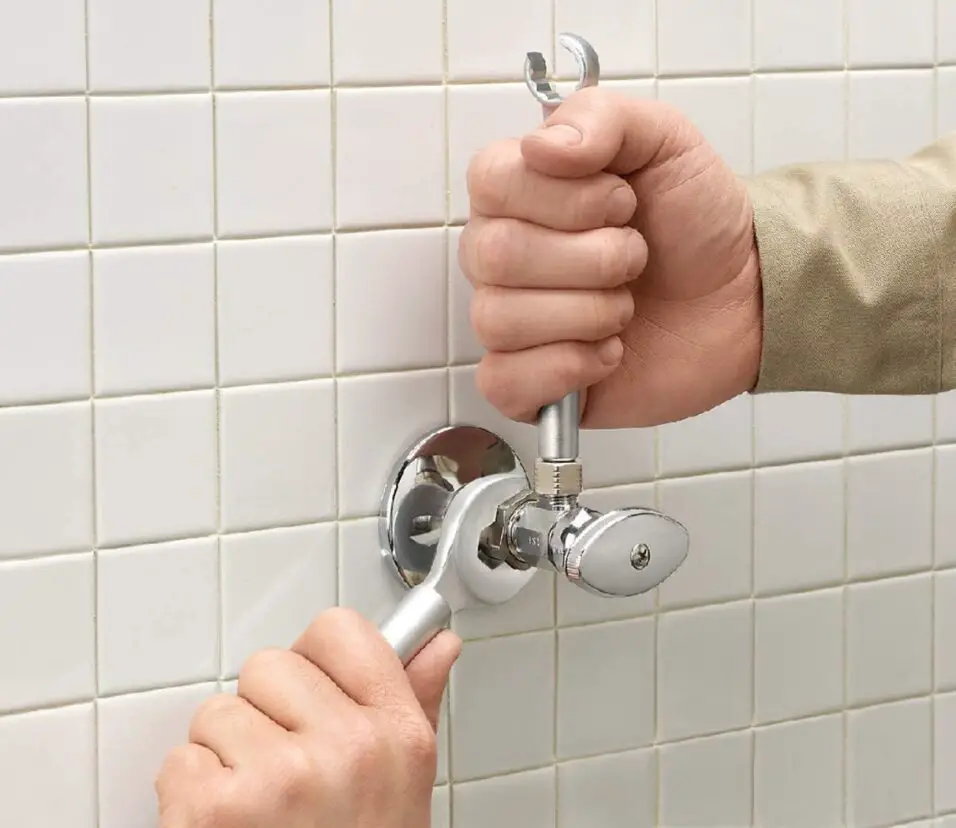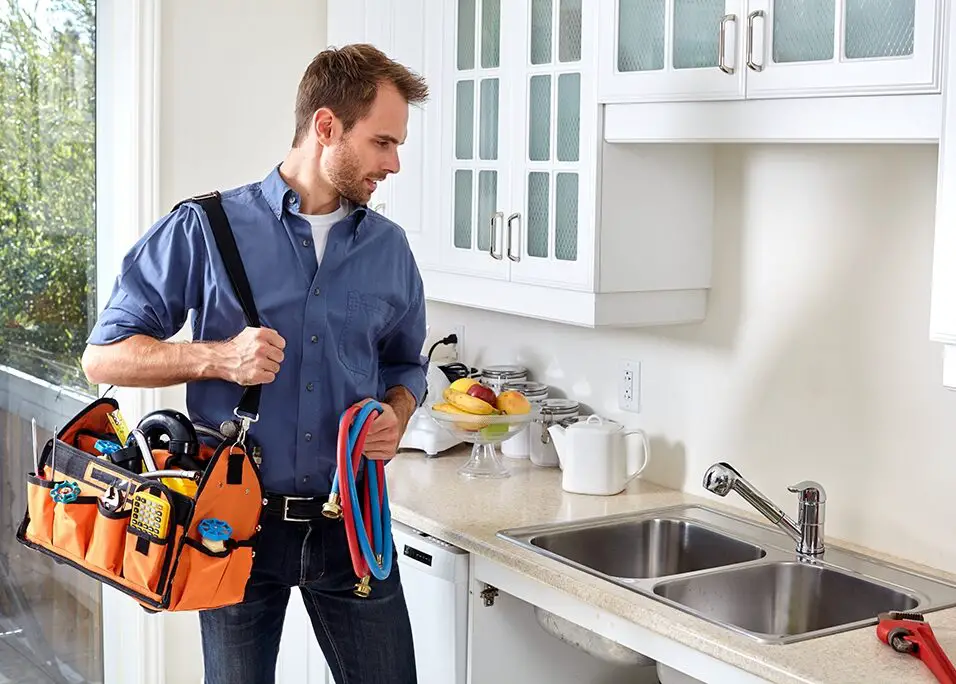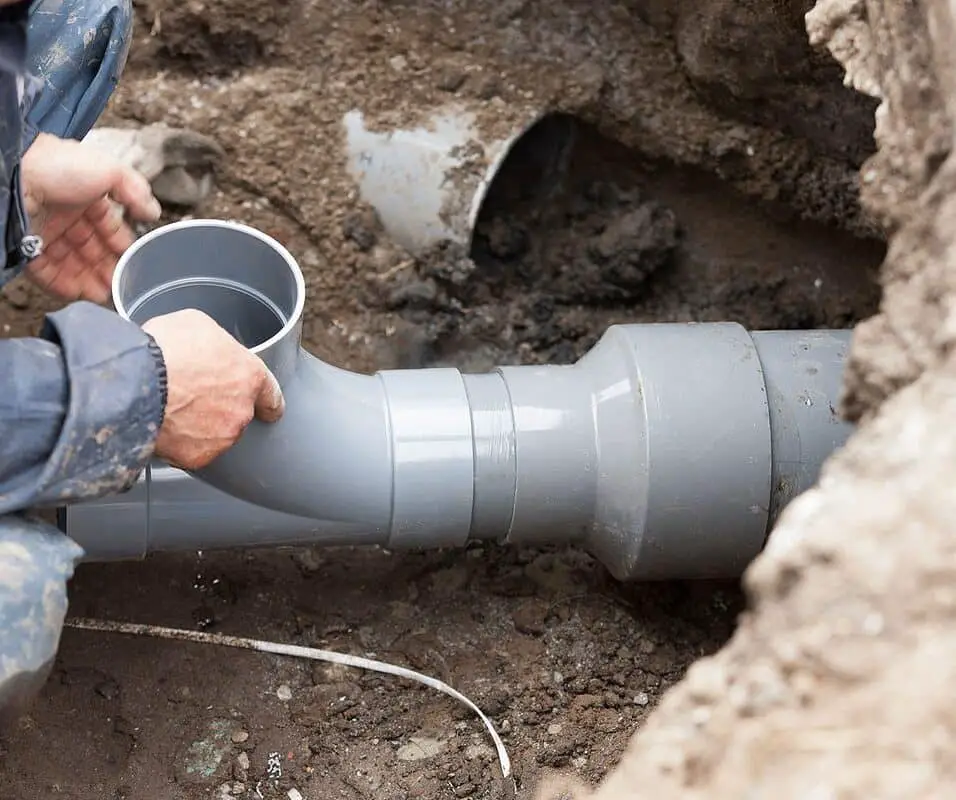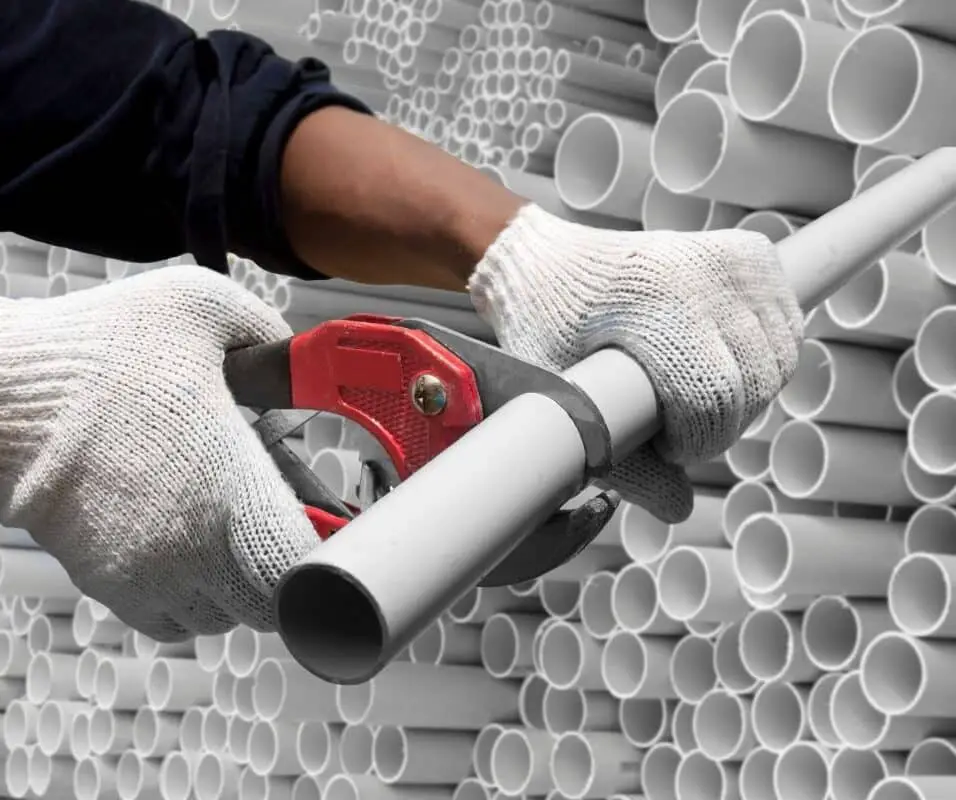When To Use Plumbing Tape
Introduction
Plumbing tape, also known as thread seal tape or PTFE tape, is a versatile tool used in various plumbing applications. It is a thin, flexible tape made from polytetrafluoroethylene (PTFE), a non-stick material that offers excellent resistance to heat, chemicals, and moisture. Plumbing tape is commonly used to create watertight seals and prevent leaks in threaded pipe connections.
The primary purpose of plumbing tape is to provide a secure seal between threaded indoor plumbing components, such as pipes, fittings, valves, and faucets. It acts as a lubricant and a barrier, filling in the gaps between the threads to prevent water or gas from escaping. The tape’s composition allows it to withstand high pressure and temperature, making it suitable for both residential and commercial plumbing systems.
One of the main reasons to use plumbing tape is to prevent leaks in plumbing connections. Whether you’re installing new pipes, replacing fittings, or repairing a leak, plumbing tape can play a vital role in ensuring a tight and leak-free seal. It is commonly used in applications involving water pipes, gas lines, showerheads, toilet connections, and various other plumbing fixtures.

Is It Necessary To Use Plumbers Tape?
In short, thread seal tape is best used to seal up most threaded connections. However, if said connection has a rubber seal or gasket, you also do not need thread seal tape.
Plumbers tape, also known as thread seal tape or Teflon tape, is a thin, white tape commonly used in plumbing applications. It is made of polytetrafluoroethylene (PTFE), a material known for its nonstick properties and resistance to chemicals. While not always necessary, plumbers tape serves an essential purpose in certain plumbing situations.
The primary function of plumbers tape is to create a watertight seal between threaded pipe fittings. When wrapping the tape around the threads of a pipe or fitting, it fills in any gaps or irregularities, preventing leaks. The tape acts as a lubricant during the tightening process, allowing for smoother and more secure connections.
One of the advantages of plumbers tape is its versatility. It can be used with a variety of pipe materials, including metal and plastic. Moreover, it is compatible with both water and gas systems, making it a valuable tool in various plumbing projects. While some plumbing connections may already have built-in seals or gaskets, using plumbers tape as an additional precaution can provide added security and peace of mind.
Does Plumbers Tape Stop Leaking?
Plumbers, on the other hand, use plumber’s tape when they put in new pipes and fittings. It keeps things from leaking by making the seal between parts that are put together stronger.
Yes, plumbers tape, which is also called thread seal tape or Teflon tape, was made to help stop leaks in pipes. When used properly, it can stop a leak if it is in the right place.
Polytetrafluoroethylene (PTFE), which is used to make plumber’s tape, doesn’t stick to things and is resistant to chemicals. It is often used to make a watertight seal on threaded pipe fittings. The tape makes a shield by filling in any holes or gaps between the threads. This keeps water or gas from leaking out.
It’s important to wrap plumber’s tape tightly and evenly around the threads of the pipe or fitting when using it. This helps make sure the seal is tight and reduces the chance that it will leak. It is best to wrap the tape so that it goes in the opposite direction of the threads. This way, when the fitting is tightened, it will fit better.
It works best at threaded connections, like those in taps, showerheads, and pipe joints, to stop leaks. If the leak is coming from somewhere else, like a crack in a pipe or a bad seal, you may need to take more steps, like fix or replace the pipe.
Do You Use Plumbers Tape On Pvc?
Here are some things to do and not to do when putting together PVC joints: Don’t give joints “one more turn just to be sure.” This will make them too tight.Do finger tighten plus one or two turns, but no more. Don’t use Teflon tape, Teflon paste, or pipe dope to make the joint bigger or smooth it out. For threaded parts, do use a sealant.
Most of the time, plumbers tape is not used on polyvinyl chloride (PVC) lines or fittings. PVC is a type of plastic that is often used in water systems because it is cheap, lasts a long time, and doesn’t rust. When working with PVC lines, there are different ways to make a seal that keeps water out, and plumbers tape is usually not needed.
Most of the time, solvent cement or PVC glue is used to connect PVC lines and fittings instead of plumber’s tape. These glues are made to work with PVC and make a strong, long-lasting link between the pipe and the fitting. The solvent cement is put on the outside of the pipe and the inside of the fitting. When the pipe and fitting are pushed together, the glue chemically fuses the surfaces, making a strong link that won’t leak.
If you use plumber’s tape on PVC lines, it might not work. The tape isn’t made to stick to the smooth surface of PVC, so it might not make a good bond. In fact, putting plumber’s tape on PVC joints can cause leaks because it can get in the way of how solvent cement or PVC glue is put on.
How Long Does Plumbing Tape Last?
Silicone tape can help form a temporary waterproof seal and prevent water from leaking until you replace the pipe. How Long Does Pipe Leak Tape Last? Pipe thread tape can last for years. As long as the joint isn’t leaking, you can consider it a long-term solution.
The lifespan of plumbing tape, also known as thread seal tape or Teflon tape, can vary depending on various factors such as usage, environmental conditions, and the quality of the tape itself. However, when properly applied and used in typical plumbing applications, plumbing tape can last for several years.
Plumbing tape is generally made of polytetrafluoroethylene (PTFE), a material known for its durability and resistance to chemicals. PTFE has excellent stability and can withstand a wide range of temperatures, making it suitable for use in plumbing systems.
The longevity of plumbing tape also depends on how it is stored. It is essential to keep the tape in a dry and cool environment, away from direct sunlight, extreme temperatures, and moisture. Exposure to moisture or high heat can degrade the tape and shorten its lifespan.
Furthermore, the quality of the tape can play a role in its durability. Higher quality plumbing tapes are often thicker and made with better materials, which can contribute to a longer lifespan. Cheaper or lower-quality tapes may be more prone to deterioration over time.
Is Plumbers Tape Safe?
Key Point: PFAS in plumber’s tape have many benefits, such as making the tape last longer, resisting heat, and keeping chemicals out. But using them could make drinking water unsafe, but more research is needed. Risks that could come from PFAS getting into drinking water.
Yes, plumbers tape is usually thought to be safe when used in plumbing as advised. It is made of polytetrafluoroethylene (PTFE), which is a non-toxic material used in many fields, including pipes.
Plumbers tape is made to be safe for use with devices that use potable water. It can stand up to chemicals like chlorine and other disinfectants, which are often used in water systems. This means that it won’t react with the water or let any harmful chemicals into the plumbing system.
Also, most plumbing tape is safe to touch with your bare hands. It doesn’t have any known harmful ingredients and, when used properly, isn’t known to hurt your health in any way.
Like any other product, plumbers tape should be used the way it was meant to be used and in line with safety rules. For proper application and use, it is important to follow the directions from the manufacturer.
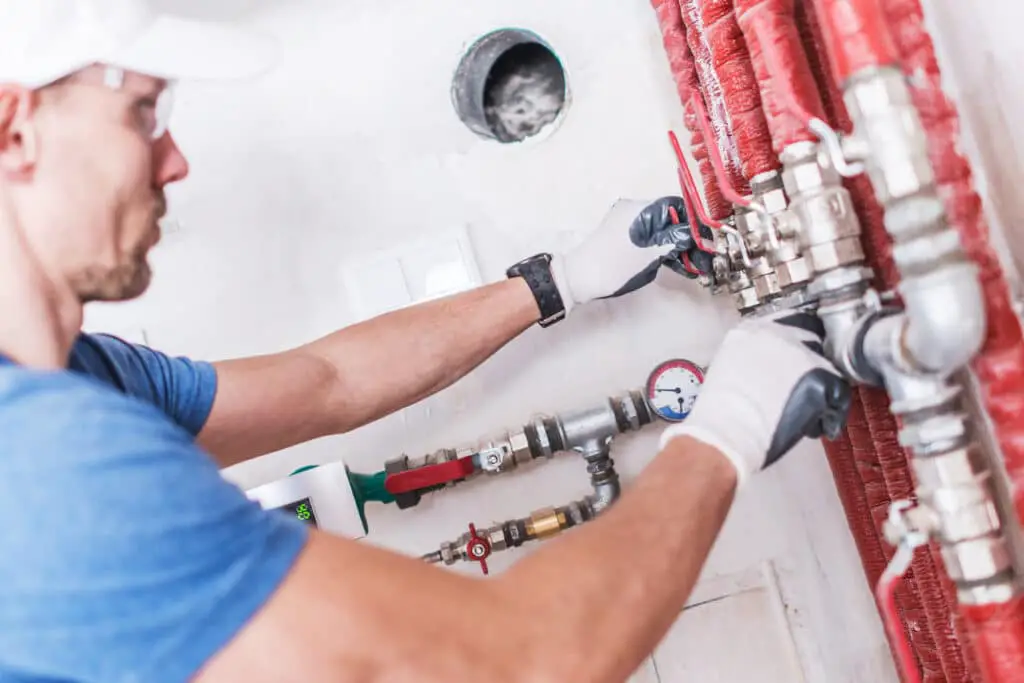
What Is Plumbers Tape Called?
Thread seal tape, also called PTFE tape, Teflon tape, or plumber’s tape, is a polytetrafluoroethylene (PTFE) film tape that is often used in plumbing to seal pipe threads. The tape is sold cut to specific lengths and wound on a spool, which makes it easy to wrap around pipe threads.
People often call plumbers tape by different names, like thread seal tape, Teflon tape, or PTFE tape. People often use both of these terms to talk about the same thing.
This kind of tape “thread seal tape” because its main job is to make a seal between threaded pipe parts. It stops leaks by filling in gaps and bumps between the threads, making sure the link is tight and secure.
Plumbers tape is also sometimes called Teflon tape. The tape is usually made of polytetrafluoroethylene (PTFE), which is a brand name for the material. PTFE doesn’t stick to things, doesn’t react with chemicals, and can handle a wide range of temperatures, all of which make it good for use in plumbing.
Plumbers tape is also known as thread seal tape and Teflon tape, but it can also be called PTFE tape. This name stresses the material it is made of and is often used in technical or industry-specific settings.
Can Plumbers Tape Get Hot?
PTFE tapes can operate safely at -200 Celsius and function best at +260 Celsius.
Plumbers tape, commonly known as thread seal tape or Teflon tape, can withstand pipe temperatures. Polytetrafluoroethylene (PTFE) is stable at high temperatures.
Plumber’s tape usually works in plumbing systems’ hot and cold temperatures. It is designed to maintain sealing at -450°F to 500°F (-268°C to 260°C). This makes it suitable for hot water lines, steam systems, and heating systems.
Plumber’s tape can seal hot lines and fittings from leaks. When plumbing temperatures are normal, PTFE tape doesn’t melt or change shape. It keeps threaded links together and fills gaps and uneven places.
Too high or low temperatures might harm plumbing tape. In industrial or specialized applications with high temperatures, check with the tape’s manufacturer or a plumber to be sure it will function.
Why Use Plumbers Tape?
It also lubricates the connection, smoothing the threads, and prevents pipes from sticking when disassembling the joint.
Plumbers tape (thread seal tape or Teflon tape) is used in plumbing for numerous reasons.
Plumbers tape is used to seal threaded pipe fittings. Tape prevents leaks and secures connections by filling gaps and imperfections around threads. This helps protect plumbing system integrity in pressure or vibration-exposed situations.
Versatility is another plumbers tape feature. It works with metal and plastic pipes. It works with water and gas systems, making it useful for many plumbing operations.
Plumbers tape is relatively easy to use, making it suitable for both professional plumbers and DIY enthusiasts. It is a cost-effective solution for creating reliable seals and preventing leaks. Additionally, the tape acts as a lubricant during the tightening process, allowing for smoother and more secure connections.
What Is Plumbing Tape?
Plumbing tape, also known as thread seal tape or Teflon tape, is a thin, white tape used to create a watertight seal in plumbing connections.
Plumbing tape, also known as thread seal tape or Teflon tape, is a thin, flexible material commonly used in plumbing applications. It is typically made of polytetrafluoroethylene (PTFE), a nonstick material known for its resistance to chemicals and temperature stability.
The main purpose of plumbing tape is to create a watertight seal between threaded pipe fittings. When applied correctly, it fills in gaps and irregularities between the threads, preventing leaks and ensuring a secure connection. This is particularly important in plumbing systems where water or gas pressure is present. Plumbing tape is often white and comes in rolls. It is wrapped around the threads of pipes or fittings before they are screwed together. The tape acts as a lubricant during the tightening process, allowing for smoother and more secure connections.
One of the advantages of plumbing tape is its versatility. It can be used with various pipe materials, such as metal or plastic, and is compatible with both water and gas systems. This makes it a valuable tool in a wide range of plumbing projects. Plumbing tape is relatively easy to use and cost-effective. It is widely available at hardware stores and plumbing supply outlets. It can be purchased in different widths and lengths, allowing for flexibility in various plumbing applications.

Conclusion
Plumbing tape is a valuable resource that should be utilized in various plumbing scenarios. Its ability to create secure seals and prevent leaks in threaded connections makes it an indispensable tool for both professionals and DIY enthusiasts. Knowing when to use plumbing tape is crucial for maintaining the integrity of your plumbing system. It should be applied whenever there is a need for a watertight seal in threaded pipe connections, such as when installing new pipes, replacing fittings, or repairing leaks.
By using plumbing tape correctly, you can significantly reduce the risk of leaks, which can lead to water damage, wasted resources, and costly repairs. Plumbing tape is particularly effective in applications involving water pipes, gas lines, showerheads, toilet connections, and other plumbing fixtures. It is a versatile solution that can withstand high pressure and temperature, ensuring long-lasting and reliable seals.
Furthermore, plumbing tape can serve as a temporary fix or a preventive measure in situations where immediate repairs are not possible. Applying tape to minor leaks or suspected weak points in the plumbing system can provide a temporary seal, allowing you to address the issue at a later time without immediate consequences.




